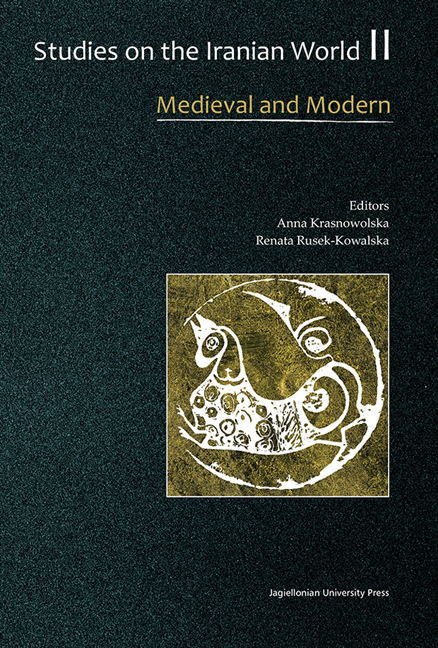Book contents
- Frontmatter
- Contents
- Foreword
- Linguistics
- Literature
- Religion
- History
- Arts
- Social and Cultural Studies
- Amulets and Medical Cures in the Yaghnob Valley: an Overview of Yaghnobi Traditional Medicine between Magic and Healing Folklore
- Persian Cookbooks, the ‘Myth’ of National Cuisine and the Process of Modernisation
- Modernity and Fertility Decline in Iran
- Medicine and Anthropology: the ‘Ambassador-Physician’ Jacob Eduard Polak (1818–1891) as a Mediator of Modernity in Iran
- Anatomy and Therapy of Eye-Diseases in Esmā῾īl Gorgānī Compared to Syriac Sources
- The Trans-Iranian Railway – History and Socio-Political Implications
- Traditional Diet and Allopathic Medicine in Diagnosis and Treatment in Iran
Medicine and Anthropology: the ‘Ambassador-Physician’ Jacob Eduard Polak (1818–1891) as a Mediator of Modernity in Iran
from Social and Cultural Studies
Published online by Cambridge University Press: 12 January 2018
- Frontmatter
- Contents
- Foreword
- Linguistics
- Literature
- Religion
- History
- Arts
- Social and Cultural Studies
- Amulets and Medical Cures in the Yaghnob Valley: an Overview of Yaghnobi Traditional Medicine between Magic and Healing Folklore
- Persian Cookbooks, the ‘Myth’ of National Cuisine and the Process of Modernisation
- Modernity and Fertility Decline in Iran
- Medicine and Anthropology: the ‘Ambassador-Physician’ Jacob Eduard Polak (1818–1891) as a Mediator of Modernity in Iran
- Anatomy and Therapy of Eye-Diseases in Esmā῾īl Gorgānī Compared to Syriac Sources
- The Trans-Iranian Railway – History and Socio-Political Implications
- Traditional Diet and Allopathic Medicine in Diagnosis and Treatment in Iran
Summary
SUMMARY
In the 19th century, the transfer of knowledge and culture between Europe and Islamic polities had far-reaching effects on both sides. Yet in this process, the field of medical sciences has not received the attention it deserves, particularly when looking into the relations between the largest European states, the Habsburg Empire and Western Asia states. This article discusses the case of the Austrian physician J.E. Polak (1818–1891) who pioneered the introduction of Western medical sciences in Iran. In 1851 he established the first modern medical school at Dār'ol-Fonun and worked as a teacher of medicine and surgery. In 1855 Polak became the personal physician of the Iranian king Nāser al-Dīn Shāh Qājār and, travelling widely in Iran, he transmitted detailed accounts of the land and the people to Europe, based on the emerging modern concepts of science. His legacy is felt in the modern history of medicine in Iran to this day, and his wealth of numerous writings about Iran contributed to the tightening of Austro-Iranian relations throughout the century. The article demonstrates how to analyze Polak's varied medical and ethnological accomplishments and his influence in the development of modern medicine in Iran, within the theoretical frame of the transfer of knowledge.
Austria's direct contact with the Islamic world dates back to the early modern period. A multifaceted political, economic and cultural exchange continued to develop during the following centuries. In the nineteenth century, these contacts intensified as Austria became the administrator of former Ottoman Bosnia-Herzegovina (after 1878) and now had to govern Muslim citizens within its multiethnic ‘Vielvölkerstaat’, in which Islam later became an officially recognized religion. A regular transfer of knowledge and culture between the Austrian Empire and Islamic polities had far reaching effects, especially in the field of medicine. Austrian physicians pioneered the introduction of modern medicine in the Ottoman Empire, Egypt and Iran. Some of these ‘ambassador physicians’ were astute observers of land and people, and during many years of residence transmitted detailed accounts of ‘Diseases of the Orient’ as well as natural and cultural knowledge about their host countries to Europe. Despite the logistical difficulties of travel and mail at the time, there was a lively exchange of information. In Austria, this transfer of knowledge made substantial contributions to the field of Oriental Studies.
- Type
- Chapter
- Information
- Studies on the Iranian WorldMedieval and Modern, pp. 329 - 340Publisher: Jagiellonian University PressPrint publication year: 2015

